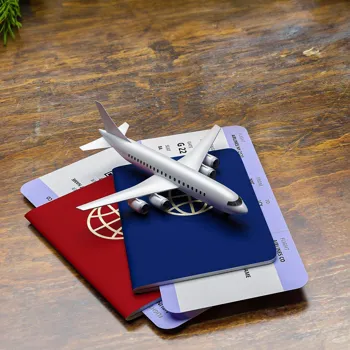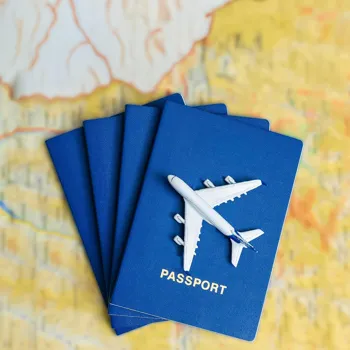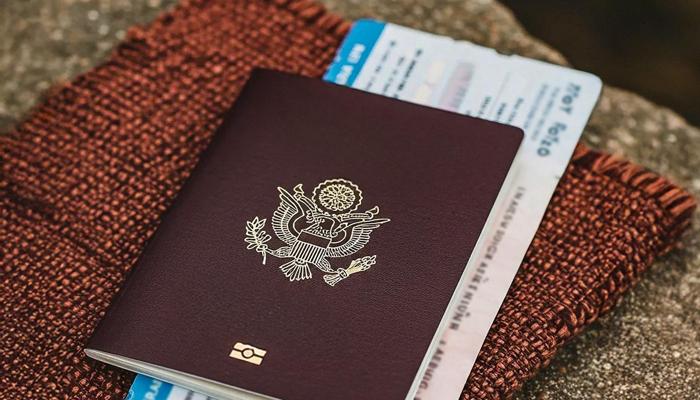Discover the must-have travel documents every Indian traveler needs! Be prepared for seamless journeys
Travelling, whether it's a quick domestic getaway or an ambitious international adventure, is always
thrilling. But amidst the excitement of packing your bags and planning your itinerary, it's easy to overlook the most crucial aspect: your travel documents.
Imagine reaching the airport and realizing your passport is expired, or being asked for proof of accommodation and fumbling through your emails. Such situations can quickly turn your dream vacation into a stressful nightmare.
That's why, dear Indian travellers, it's absolutely essential to have all your necessary documents readily available and well-organized before embarking on any journey.
This article will guide you through the top 10 travel documents you should always keep on hand, ensuring a smooth and hassle-free travel experience.
Passport: Your Key to International Adventures
For international travel, your passport is undoubtedly the most important document. It serves as your identification and proof of citizenship in foreign countries. Before you even think about booking your flights, check your passport's expiry date.
Many countries require your passport to be valid for at least six months beyond your intended stay. If it's nearing expiry, renew it well in advance to avoid any last-minute panic. Make a photocopy of your passport's information page and keep it separate from your original passport.
This can be useful in case of loss or theft. Also, consider storing a digital copy of your passport on your phone or in a secure cloud storage. Remember to handle your passport with care and protect it from damage or loss. A damaged passport might not be accepted by immigration authorities.
It's a good idea to invest in a passport holder to keep it safe and secure. Taking these precautions will prevent unnecessary delays or complications during your international travels and let you travel in peace.
Ensure that your passport photograph is clear and recent, as this is used to verify your identity.
Visa: Entry Permit to Your Dream Destination
A visa is an official authorization that allows you to enter a foreign country. Visa requirements vary depending on your nationality and the country you plan to visit. Research the visa regulations for your destination well in advance of your trip.
Some countries offer visa-free entry to Indian citizens for certain durations, while others require you to apply for a visa before arrival. The visa application process can sometimes be time-consuming, so start the process early to avoid any last-minute rush.
Keep a copy of your visa application form and any supporting documents you submitted. If you are traveling to multiple countries, make sure you have the necessary visas for each destination. Carry your visa along with your passport at all times during your trip.
Some countries also offer electronic visas (e-visas), which you can download and print. Make sure to print a copy of your e-visa and keep it with your travel documents.. Understanding visa requirements is critical for seamless travel.
Visa rules need to be adhered to at all times to prevent deportation under any circumstances.
Flight Tickets: Your Confirmed Journey
Whether you're flying domestically or internationally, having your flight tickets readily available is essential. Nowadays, most airlines offer e-tickets, which are sent to your email address. Print a copy of your e-ticket or save it as a PDF on your phone.

Alternatively, you can use the airline's mobile app to access your boarding pass. Check your flight details carefully, including the flight number, date, time, and airport terminal. Arrive at the airport with sufficient time, especially if you need to check in baggage or go through security.
Keep your flight tickets easily accessible, as you'll need to present them at various checkpoints. It's also crucial to be aware of the airline's baggage allowance and any restrictions on prohibited items. Confirm your flight status online before leaving for the airport.
Flight schedules may be affected due to weather. Taking care to download the details, you can embark on a smooth journey. Avoid sharing the information with all.
Hotel Bookings and Accommodation Details: Your Home Away From Home
Having confirmed hotel bookings or accommodation details is essential, especially when traveling to a new city or country. Keep a printed copy or a digital copy of your hotel confirmation voucher readily available.

This voucher typically includes the hotel's name, address, contact number, booking dates, and room type. You may be asked to present this voucher at the hotel check-in counter.
If you're staying with friends or family, it's a good idea to have their contact information and address readily available. You can also carry a letter from your host confirming your stay at their residence. This can be helpful in case immigration authorities ask for proof of accommodation.
Booking in advance ensures your peace of mind. Be careful about advance bookings through untrusted portals. It is always advisable to check for hotel reviews online before making bookings. Booking details need to show the purpose of your accommodation at all times.
Travel Insurance: Your Safety Net on the Road
Travel insurance is a must-have for any trip, providing financial protection against unforeseen events such as medical emergencies, trip cancellations, lost luggage, or flight delays. Before you travel, purchase a comprehensive travel insurance policy that covers your specific needs and destination.
Keep a copy of your travel insurance policy document and the insurance company's contact information readily available. Familiarize yourself with the policy's terms and conditions, including the coverage limits and exclusions.
In case of an emergency, knowing how to make a claim can save you considerable time and stress. Travel insurance offers you peace of mind, knowing that you're protected against unexpected events that could disrupt your trip.
Many insurance companies have a 24 X 7 support line in the event of a travel disruption. Many policies cover the cost of hotel stay and food in the event of unavoidable disruption in travel. It is always good to be prepared with the right travel insurance.
Identification Documents: Proving Who You Are
While your passport serves as your primary identification document for international travel, it's also important to carry other forms of identification, especially for domestic trips. Keep your Aadhaar card, PAN card, driver's license, or voter ID card readily available.
These documents can be useful for verifying your identity at hotels, airports, or other establishments. Make a photocopy of your identification documents and keep them separate from your original documents. You can also store a digital copy on your phone or in a secure cloud storage.
When traveling with children, carry their birth certificates or school ID cards as proof of their identity. Having multiple forms of identification can be helpful in case your primary ID gets lost or stolen. Be aware of local laws and regulations regarding identification requirements.
Store the documents in a safe place. Protect these documents from being misused.
Vaccination Certificates: Ensuring Your Health and Safety
In the wake of the COVID-19 pandemic, many countries require travellers to present proof of vaccination before entering. Check the vaccination requirements for your destination well in advance of your trip.
If you're fully vaccinated, download or print your vaccination certificate and keep it readily available. Some countries may also require you to provide a negative COVID-19 test result before departure. Make sure to get tested within the specified timeframe and keep a copy of your test report.
Check with your doctor about any other necessary vaccinations or health precautions for your destination. Carry your vaccination records and any other relevant medical documents with you.
These precautions will help ensure your health and safety while traveling and allow you smooth entry into the country. Understand any quarantine and health advisory requirements and strictly adhere to them. Health comes first and must be protected at all times during your travels.
Driving License: Hitting the Open Road
If you plan to rent a car and drive in India or abroad, you'll need to carry your driving license. Ensure that your driving license is valid and hasn't expired. You may also need to obtain an International Driving Permit (IDP) if you're driving in a foreign country.

An IDP is essentially a translation of your driving license into multiple languages. Keep your driving license and IDP readily available while driving. Familiarize yourself with the local traffic laws and regulations before hitting the road.
Be aware of speed limits, traffic signals, and other road signs. Drive safely and responsibly, and always wear your seatbelt. Having a valid driving license and understanding local driving rules will ensure a safe and enjoyable road trip.
Check the rules for driving in each country you are planning to drive.
Credit and Debit Cards: Your Financial Backup
While it's always a good idea to carry some cash for immediate expenses, credit and debit cards are essential for making larger purchases and managing your finances while traveling. Inform your bank about your travel plans so that they don't block your card for suspicious activity.
Keep your credit and debit cards safe and secure, and be cautious when using ATMs or making online transactions. Consider carrying a backup credit card in case your primary card gets lost or stolen. Download your bank's mobile app to track your spending and manage your account.
Be aware of currency exchange rates and any transaction fees that may apply. Having access to your funds through credit and debit cards will provide you with flexibility and convenience during your trip. Contact the bank immediately if the card is lost/stolen.
Emergency Contact Information: Staying Connected
It's crucial to have emergency contact information readily available in case of an accident or other unforeseen event. Create a list of emergency contacts, including family members, friends, and your insurance provider. Keep this list in your wallet, purse, or phone.
You may also want to inform your emergency contacts about your travel plans and itinerary. In case of an emergency, having this information readily available can help you get the assistance you need quickly. Share this information with your family as well for faster contact.
Keep local police contact numbers readily available at all times.
By ensuring you have these 10 essential travel documents on hand, you can minimize stress and maximize your enjoyment on your next adventure. Safe travels.






















